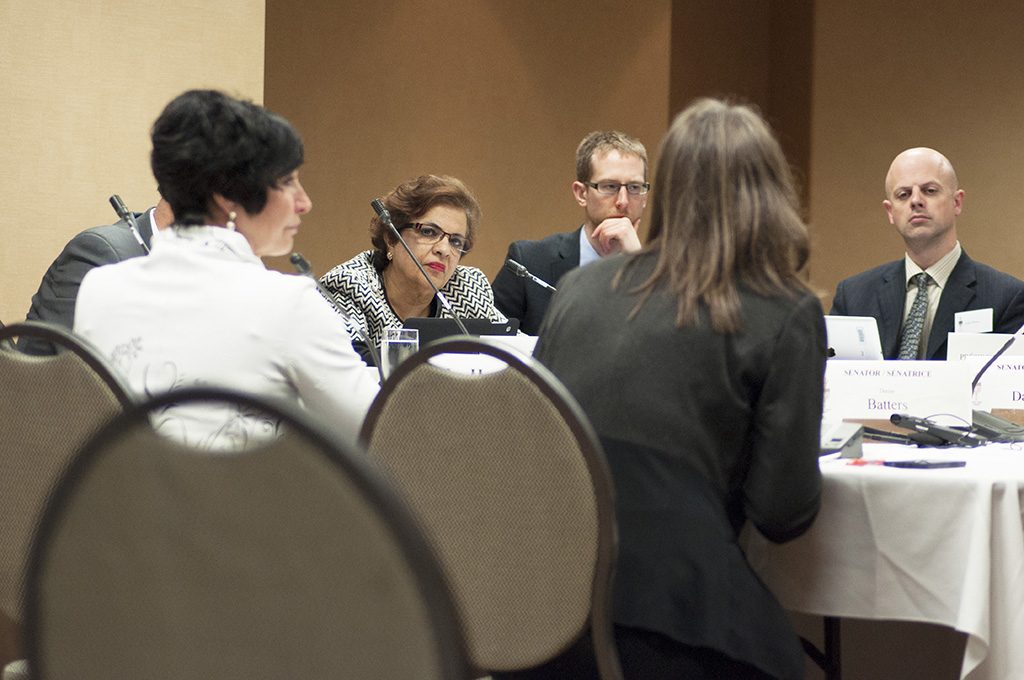A different approach to justice


The time to act on court delays is now.
With serious criminal charges stayed as a result of court delays, Senators are looking for new ways to turn the wheels of justice a little quicker.
Senators George Baker, P.C., Denise Batters, Q.C., and Claude Carignan, P.C., unveiled an interim report on court delays from the Senate’s Legal and Constitutional Affairs Committee, entitled Delaying Justice Is Denying Justice: An Urgent Need to Address Lengthy Court Delays in Canada, at the Canadian Bar Association Legal Conference in July.
The committee has travelled to Halifax to learn more about restorative justice, and is now headed to Vancouver, Calgary, and Saskatoon to continue studying court delays.
Halifax, May 2016
Halifax is infamous for its rainy spring weather and a visit by members of the Senate Committee on Legal and Constitutional Affairs was no exception.
The committee traveled to the slate-skied city to learn more about this approach, which could help reduce court delays across the country; the committee is currently studying ways to unblock the country’s clogged court system. Restorative justice is a response to crime that focuses on the losses suffered by victims and communities. Available to young people between 12 and 17 years old, it consists of face-to-face meetings between the victim, the offender and community members. The objective is to develop a common understanding of the impact of the offence and the steps needed to make amends.
It is thus a more holistic and inclusive approach. According to many witnesses, it’s particularly effective at meeting the needs of young people who have run afoul of the law.
“It’s a system that not only gives victims a voice, but also helps accused people to grow and avoid repeating their mistakes,” said Senator Mobina Jaffer, deputy chair of the committee.
That, in turn, helps alleviate pressure on the justice system.
Committee members began the day by taking part in a “sharing circle,” as though they were participating in an actual restorative justice session.
Key members of the Nova Scotia justice system sat in the middle of the room to share their experiences – the seven senators seated around them listened attentively and asked many questions.
Afterwards, they met with Chief Judge Pamela Williams.
According to her, restorative justice not only benefits victims and accused people, it also reduces costs that would otherwise be borne by everyone.
“It keeps youth outside of emergency rooms and hospitals, it reduces contacts with police and keeps them outside of jails,’’ said Chief Judge Williams.
Committee members also visited a mental health court.
“As a longtime proponent of diverting the mentally ill out of the criminal justice and correctional systems, I was especially impressed by the mental health court,” said Senator Bob Runciman, chair of the committee. “The approach they take and the inter-disciplinary team they’ve built are impressive and I think they’re having a measurable impact. “
After a meal with members of Dalhousie University’s law faculty the Senators spent the rest of the day in public hearings.
Paula Marshall, program manager for the Mi’Kmaq Legal Support Network, said restorative justice programs can be especially beneficial to young members of First Nations.
“We would like more contact with our community and more opportunities to work with our people,” said Paula Marshall.
The quick visit to Halifax may have lasted less than 24 hours, but the productive sessions brought a flood of ideas to reduce court delays in Canada and about how restorative justice may help to achieve this goal.



Related articles
Tags
Committee news
A different approach to justice


The time to act on court delays is now.
With serious criminal charges stayed as a result of court delays, Senators are looking for new ways to turn the wheels of justice a little quicker.
Senators George Baker, P.C., Denise Batters, Q.C., and Claude Carignan, P.C., unveiled an interim report on court delays from the Senate’s Legal and Constitutional Affairs Committee, entitled Delaying Justice Is Denying Justice: An Urgent Need to Address Lengthy Court Delays in Canada, at the Canadian Bar Association Legal Conference in July.
The committee has travelled to Halifax to learn more about restorative justice, and is now headed to Vancouver, Calgary, and Saskatoon to continue studying court delays.
Halifax, May 2016
Halifax is infamous for its rainy spring weather and a visit by members of the Senate Committee on Legal and Constitutional Affairs was no exception.
The committee traveled to the slate-skied city to learn more about this approach, which could help reduce court delays across the country; the committee is currently studying ways to unblock the country’s clogged court system. Restorative justice is a response to crime that focuses on the losses suffered by victims and communities. Available to young people between 12 and 17 years old, it consists of face-to-face meetings between the victim, the offender and community members. The objective is to develop a common understanding of the impact of the offence and the steps needed to make amends.
It is thus a more holistic and inclusive approach. According to many witnesses, it’s particularly effective at meeting the needs of young people who have run afoul of the law.
“It’s a system that not only gives victims a voice, but also helps accused people to grow and avoid repeating their mistakes,” said Senator Mobina Jaffer, deputy chair of the committee.
That, in turn, helps alleviate pressure on the justice system.
Committee members began the day by taking part in a “sharing circle,” as though they were participating in an actual restorative justice session.
Key members of the Nova Scotia justice system sat in the middle of the room to share their experiences – the seven senators seated around them listened attentively and asked many questions.
Afterwards, they met with Chief Judge Pamela Williams.
According to her, restorative justice not only benefits victims and accused people, it also reduces costs that would otherwise be borne by everyone.
“It keeps youth outside of emergency rooms and hospitals, it reduces contacts with police and keeps them outside of jails,’’ said Chief Judge Williams.
Committee members also visited a mental health court.
“As a longtime proponent of diverting the mentally ill out of the criminal justice and correctional systems, I was especially impressed by the mental health court,” said Senator Bob Runciman, chair of the committee. “The approach they take and the inter-disciplinary team they’ve built are impressive and I think they’re having a measurable impact. “
After a meal with members of Dalhousie University’s law faculty the Senators spent the rest of the day in public hearings.
Paula Marshall, program manager for the Mi’Kmaq Legal Support Network, said restorative justice programs can be especially beneficial to young members of First Nations.
“We would like more contact with our community and more opportunities to work with our people,” said Paula Marshall.
The quick visit to Halifax may have lasted less than 24 hours, but the productive sessions brought a flood of ideas to reduce court delays in Canada and about how restorative justice may help to achieve this goal.





